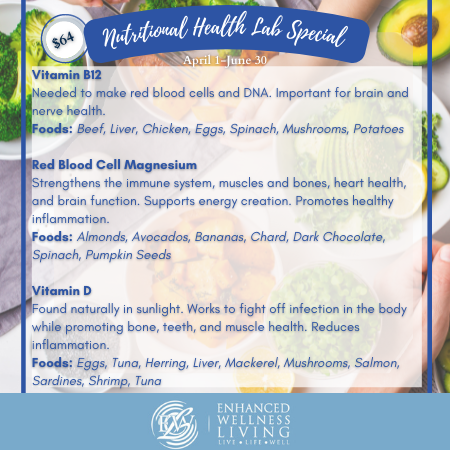At Enhanced Wellness Living, we take a food first approach to wellness! From April 1-June 30, we’re offering a Nutritional Health Lab to all EWL Members for $64, where we take a deep dive into your Vitamin D, Vitamin B12, and Red Blood Cell Magnesium levels! Stress management and better sleep rely on proper nutrition, and resilience comes from good stress management, great sleep, and even better nutrition! This is why it’s so important to take a food first approach to health, but blood work is also handy to see what’s going on from the inside out!
Vitamin B12 is needed to convert food into energy, is important for metabolism health, gut health, producing red blood cells and DNA, and brain health. B12 can be found in foods such as beef, liver, chicken, eggs, spinach, mushrooms, and potatoes. You may be low in B12 if: you have swelling of the tongue, numbness in your hands or feet, infertility, irregular heartbeat, anemia, or irritability to name a few. Vitamin B12 deficiencies can take years to develop, but don’t wait until you have symptoms, get your levels checked now! Having a sufficient level of B12 can increase energy levels, improve memory, and help prevent birth defects!
Red Blood Cell Magnesium is the actual concentration or amount of magnesium in your red blood cells. These RBC Magnesium levels are important to prevent heart disease, control blood pressure, and regulate healthy levels of cholesterol. It is difficult to get enough magnesium from food alone, but high magnesium food sources are: almonds, avocado, bananas, swiss chard, dark chocolate, spinach, and pumpkin seeds. Some signs of magnesium deficiency include: poor appetite, nervousness, mood disorders, and muscle spasms or tremors. Just as too little magnesium can be a health hazard, too much can also! The best way to find out where you are at, is by getting your levels checked!
With the clocks changing and the seasons transitioning, it’s a great time to take a closer look at your Vitamin D levels. Taking too much Vitamin D can be just as detrimental as having too little, so be sure to get these levels checked each Fall (October) and Spring (April)! You may be deficient in Vitamin D if: you live in an area with high pollution, live in an area with little sunlight, spend the bulk of your time indoors, or have dark skin. Low Vitamin D can look and feel like: fatigue, aches and pains, bone or muscle pain/weakness. Strive to get outdoors more for that natural light exposure to raise your Vitamin D levels, and eat foods rich in D such as eggs, tuna, herring, liver, mackerel, mushrooms, salmon, sardines, shrimp, and tuna.
Take advantage of this awesome Nutritional Health Lab Special from April 1, 2022-June 30, 2022 to get a better idea of how healthy you are from the inside out!





